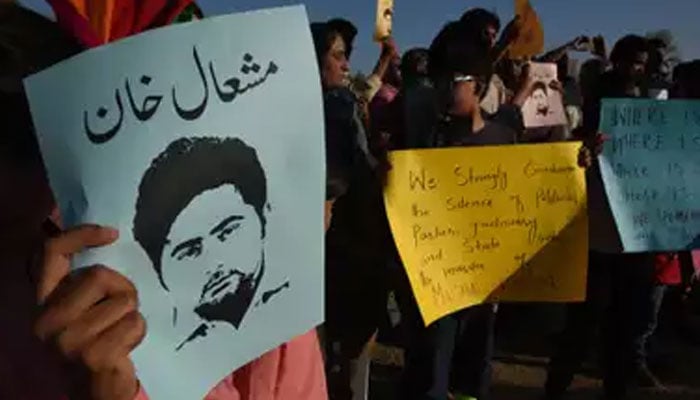Countering violent extremism through peace education
Peace education is vital for fostering balanced thinking in society. Establishing peace is indispensable for nurturing a secure landscape in Pakistan.
The scourge of extremism, radicalisation, and violence has permeated society deeply, necessitating a multi-layered approach to combat intolerance. Recent incidents, such as the harassment of a woman wearing Arabic calligraphy attire, highlight our societal challenges. Nonetheless, the prompt response of the police in rescuing the victim from a violent mob averted a tragedy.
Tragic events, such as the brutal lynching of Piranha Kumara, Mishal Khan, Mughees, and Muneeb Butt, continue to haunt us, rendering minorities vulnerable to violence. Peace education helps identify core conflict issues, resolve them, and establish lasting peace.
Additionally, ideological refutation aids in crafting a harmonious society, countering religion-based violence contrary to Islamic teachings.
Education serves as a significant instrument to transform deviant minds and foster connections between people and communities. Inclusive resilience-building, mentoring programmes, and cultural peace initiatives are essential strategies to eradicate violence. However, successful peace education requires a solid understanding of relevant policy outlines and their practical implementation. Critical thinking and the adoption of alternative narratives are crucial for preventing violence through education. Addressing radicalisation factors like geopolitical tensions and socioeconomic disparities requires a comprehensive, inclusive approach.
Respect for diversity and religious-cultural differences can counter bipartisan thinking. Positive youth transformation through peace education is key, as knowledge and vocational expertise combat violence effectively.
Formal education promotes peace, fortitude, and resilience, with academic institutions playing a pivotal role in shaping perceptions. Violence impedes progress and instills fear within communities, necessitating education as a catalyst for critical thinking and community cohesion.
Multiculturalism, acceptance of diversity, and community involvement are essential in rooting out extremism. Educational reforms promoting cultural and political pluralism aid in countering extremism in all its forms.
Soft approaches like peace education and deradicalisation are crucial complements to traditional security measures in tackling extremism.
These strategies are essential to upholding human rights and promoting peaceful coexistence in societies worldwide. —Dr Muhammad Rizwan Bhatti
-
 Trump Passes Verdict On Bad Bunny’s Super Bowl Halftime Show
Trump Passes Verdict On Bad Bunny’s Super Bowl Halftime Show -
 Super Bowl 2026 Live: Seahawks Defeat Patriots 29-13 To Win Super Bowl LX
Super Bowl 2026 Live: Seahawks Defeat Patriots 29-13 To Win Super Bowl LX -
 Kim Kardashian And Lewis Hamilton Make First Public Appearance As A Couple At Super Bowl 2026
Kim Kardashian And Lewis Hamilton Make First Public Appearance As A Couple At Super Bowl 2026 -
 Romeo And Cruz Beckham Subtly Roast Brooklyn With New Family Tattoos
Romeo And Cruz Beckham Subtly Roast Brooklyn With New Family Tattoos -
 Meghan Markle Called Out For Unturthful Comment About Queen Curtsy
Meghan Markle Called Out For Unturthful Comment About Queen Curtsy -
 Bad Bunny Headlines Super Bowl With Hits, Dancers And Celebrity Guests
Bad Bunny Headlines Super Bowl With Hits, Dancers And Celebrity Guests -
 Insiders Weigh In On Kim Kardashian And Lewis Hamilton's Relationship
Insiders Weigh In On Kim Kardashian And Lewis Hamilton's Relationship -
 Prince William, Kate Middleton Private Time At Posh French Location Laid Bare
Prince William, Kate Middleton Private Time At Posh French Location Laid Bare -
 Stefon Diggs Family Explained: How Many Children The Patriots Star Has And With Whom
Stefon Diggs Family Explained: How Many Children The Patriots Star Has And With Whom -
 Shamed Andrew ‘mental State’ Under Scrutiny Amid Difficult Time
Shamed Andrew ‘mental State’ Under Scrutiny Amid Difficult Time -
 ‘Narcissist’ Andrew Still Feels ‘invincible’ After Exile
‘Narcissist’ Andrew Still Feels ‘invincible’ After Exile -
 Bad Bunny's Super Bowl Halftime Show: What Time Will He Perform Tonight?
Bad Bunny's Super Bowl Halftime Show: What Time Will He Perform Tonight? -
 Where Is Super Bowl 2026 Taking Place? Everything To Know About The NFL Showdown
Where Is Super Bowl 2026 Taking Place? Everything To Know About The NFL Showdown -
 Chris Pratt Explains Why He And Katherine Schwarzenegger Did Premarital Counseling
Chris Pratt Explains Why He And Katherine Schwarzenegger Did Premarital Counseling -
 Drake 'turns Down' Chance To Hit Back At Kendrick Lamar At Super Bowl
Drake 'turns Down' Chance To Hit Back At Kendrick Lamar At Super Bowl -
 Sarah Ferguson Had A ‘psychosexual Network’ With Jeffrey Epstein
Sarah Ferguson Had A ‘psychosexual Network’ With Jeffrey Epstein




